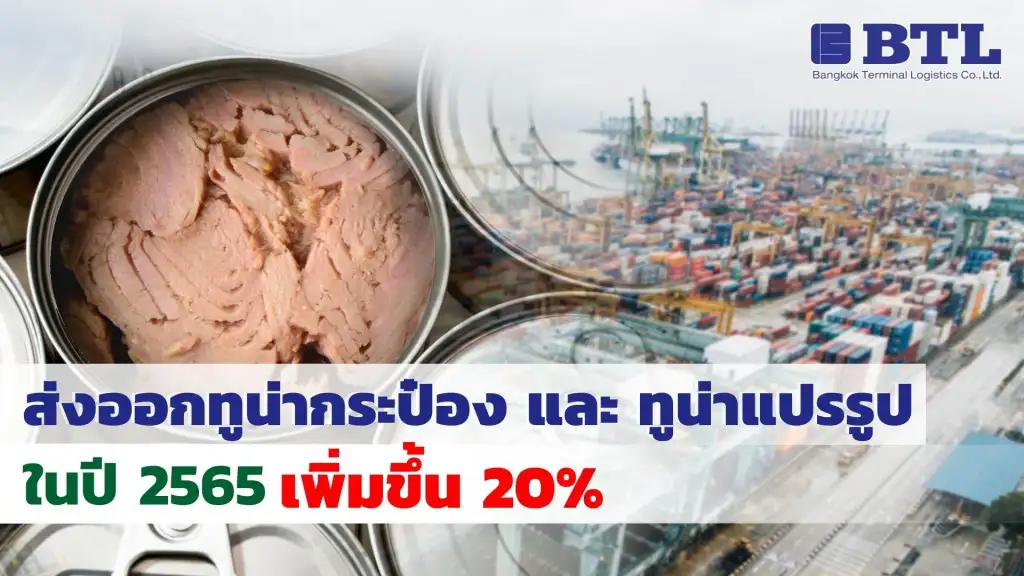Canned tuna export 2022
January – November 2022, there was a total volume of 454,852 tons, valued at 2,014.46 million US dollars (69,827.76 million baht), compared to the same period of 2021, the volume increased by 6.13 percent, the value increased by 27.59 percent.
Main Market
- United States of America
- Australia
- Japan
- Egypt
- Libya
Together they account for the proportion (56.06%)
Other markets with high growth rates
- Libya (109.87%)
- Kuwait (81.64%)
- Israel (69.77%)
Thailand’s strengths
1. Have readiness in terms of skills and production technology that are comprehensive and meet international standards.
Able to develop products that meet the needs of each market effectively.
2. Advantages in terms of location in purchasing Thai tuna from around the world.
3. Entrepreneurs have a comprehensive network, from raw material procurement, production to distribution channels in important markets.
Problems and Obstacles
- Labor shortage
- Stricter trade barriers, such as environmental measures, labor measures, tax measures, etc., and major trading partners provide more tax benefits to competitors than Thailand.
- Issuing of export certificates takes a long time, causing delays in exports.
- Negative news coverage affects the image and confidence in Thai fishery products.
- The trend towards healthy food consumption has led to a decrease in the consumption of canned and processed foods.
- The COVID-19 outbreak has caused slowdowns in orders and delivery of goods.
strategy
- Promote quality inspection systems and improve the basic infrastructure of the aquatic animal processing industry to ensure quality and hygiene in accordance with international standards.
- Operate in strict accordance with customer and target market requirements.
- Driving Good Labor Practices (GLP)
- Accelerate the development of traceability systems and encourage the use of raw materials with fishing certificates and from sources that do not have IUU fishing problems.
- Promote the creation of added value for products to expand the market, including the utilization of waste in the tuna processing industry for sustainable development.
- Expand into new potential markets and expand production bases to main markets to benefit from tax and logistics costs, as well as reduce exchange rate risks.
- Negotiate solutions and reduce trade barriers, both tariff and non-tariff, within bilateral and multilateral frameworks.
- Produce public relations media to promote exports by demonstrating tangible progress in Thailand’s problem-solving efforts.
Canned tuna exports
Canned tuna is tuna (Tuna family), skipjack (Bologna species), or bonito (Sarda species), whole or in chunks.
Not crushed, packed in airtight cans, according to Customs Tariff Sub-Category 1604.14.11 and 1604.14.19.
Procedures for exporting canned tuna in 2022
- Check international trade privileges under trade agreements and apply for a certificate of origin.
- Register for an exporter-importer identification card to be used for submitting and receiving a certificate of origin, such as Form D, Form E, Form JTEPA, General Form C/O, etc., as required by the importer, at the Foreign Trade Service Office, Department of Foreign Trade, Sanambin, Nonthaburi. Register for a central User Name at www.dft.go.th.
- Exporters check the origin characteristics of the product (check production costs) to apply for preferential tariff privileges.
- Check the regulations of the importing country and apply for licenses/certificates from the controlling or relevant authorities as required by the importing country.
Agencies related to canned tuna exports
Department of Foreign Trade
The Ministry of Commerce has designated canned tuna as a product subject to the Export Regulations B.E. 2557, dated October 15, 2014.
Rules and regulations
- Exporters are required to be members of the Thai Food Processors Association or the Thai Tuna Industry Association.
- This does not apply to cases where canned tuna is taken out on the person or in a vehicle for consumption in that vehicle or taken out for use as a sample or for research. However, the amount taken out may be as necessary.
Customs Department
- Register as an Electronic Customs Agent (Paperless)
- Submit export declaration data into the Customs Department’s computer system (e-Export)
- Check and request tax benefits from the Customs Department, such as requesting tax refunds,
Request for refund of duty under Section 19bis, Bonded Warehouse, Duty Free Zone, Office of the Board of Investment
Industrial Estate Authority of Thailand in the free trade zone or Office of the Special Economic Zone Policy Committee, etc. (select one)
Department of Fisheries
- Register to use the Fisheries Single Window (FSW) system by submitting documents to officials at the Fisheries Checkpoint or the Fishing Vessel, Aquatic Animal Products and Production Factors Inspection Division (Department of Fisheries, Central Agriculture). You will receive a username and secret code.
- Apply for a permit through the FSW system
- Notify the inspection of the goods via the FSW system so that the officers can inspect the goods before export.
Industrial Standards Institute
Apply for a permit to display the Industrial Product Standards Mark (General) from the Industrial Product Standards Office (TISI).
Food and Drug Administration
Request a product certificate (Certificate of Free Sale) from the Food and Drug Administration.
Office of the Central Islamic Council of Thailand
Request for Halal certification mark and request for Halal product certificate for export
Data source: DITP, Ministry of Commerce
————————–
Contact us for BTL service inquiries
02-681-2005 to 9
www.bkkterminal.com
m.me/BangkokTerminalLogistics



